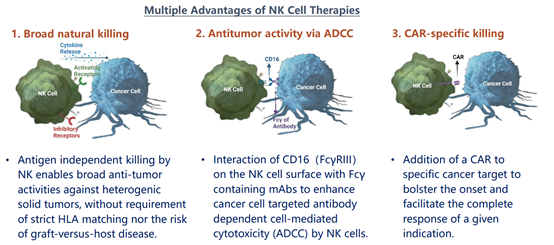

Research & Development
Natural killer (NK) cells are key players in our immune system. Derived from bone marrow lymphoid stemcells, NK cells are mainly distributed in bone marrow, peripheral blood, liver, spleen, lung, and lymph nodes. Unlike T- and B-lymphocytes, NK cells can recognize and kill a broad spectrum of ‘non-self’ cells, including tumor cells and virally infected cells, without the need for pre-immune activation or sensitization.
The mechanism of NK recognition and killing
NK cells kill target cells by recognizing the down regulation of major histocompatibility complex (MHC), or differential MHC expression from normal cells (such as tumor cells) and activating co-stimulatory signaling pathway through the interaction of NK cell activation receptors and the corresponding ligand expressed on the tumor cells. As the first line of defense and one of the main effector cells in the body to recognize cellular abnormality and malignancy, NK cells are independent of specific antigen expression, thus are suitable for a broad spectrum of conditions and diseases.

The difference between NK and T cells is that T cells require specific T cell receptors (TCRs) to recognize and kill target cells that express specific antigens, such as tumor-specific antigens. The elimination of all tumor cells through T cell therapy would require highly homogenous antigen expression within the tumor tissue. But the tumor tissue is comprised of many cell types including cancer cells and stromal cells with highly heterogenous surface antigen expression, which makes it challenging for individual T cell therapy to eliminate tumor.
On the contrary, due to their antigen-independent recognition mechanism and the diversity of activating molecules, NK cells can overcome the heterogeneity of tumor tissue to a certain extent and have the potential to make breakthroughs in the treatment of a broad spectrum of solid tumors.
Antibody dependent cell-mediated cytotoxicity (ADCC)
In addition to recognizing abnormal/non-self MHC expression to kill tumor cells, NK cells can also recognize and kill specific tumor cells by ADCC action. Many of antibody drugs widely used in cancer treatment elicit their efficacies through ADCC-mediated recognition of target cells by NK cells.
The details of the process are described as follows:
The antibody drug, after injected into the human body, is transported to various locations within the body through the circulatory system. Binding of the antibody drug to a specific antigen on the surface of a tumor cell locks the tumor cell for further recruitment of circulatory NK cells via the interaction of the Fcγ fragment of the antibody and CD16 (Fcγ receptor, FcγIII) on the surface of NK cells. The recruited NK cells then recognize the tumor cells and release granzyme and perforin, completing the antibody-mediated tumor cell killing.
Targeted killing by CAR-NK cells
A major achievement of modern synthetic biology is the invention of chimeric antigen receptor (CAR), which is generated by genetic engineering techniques and composed of an antigen-recognizing single-stranded antibody fragments (scFv), a hinge region, a co-stimulatory domain (e.g., CD28, 4-1BB), and an activating domain (e.g., CD3ζ). CAR-NK cells can be generated by introducing gene fragments encoding CAR molecules into NK cells or NK precursor cells (such as iPSCs/induced pluripotent stem cells) followed by differentiation and expansion of the edited precursor cells.
CAR-expression T cells have been successfully used in clinical treatment of hematological tumors and significantly improve treatment outcomes and survival rates in patients. Several CAR-T products have been approved for clinical use.
Clinical applications of NK cell products
NK cells, which do not kill healthy cells with normal MHC expression, do not induce graft-versus-host disease (GvHD), thus have the potential for allogenic applications.
A. Evidence from numerous clinical studies have demonstrated the safety of NK cell allogeneic applications due to no reported GvHD in patients
B. NK cell products have been used in more than 30 clinical trials for a wide range of conditions and diseases
C. More than 600 patients have been reported to have received NK cell treatments
D. No observed cytokine storm and neurotoxic side effects that are normally associated with CAR-T therapies








